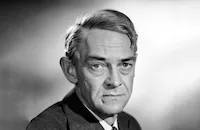The World in His Arms
Brief Synopsis
Cast & Crew
Raoul Walsh
Gregory Peck
Ann Blyth
Anthony Quinn
John Mcintire
Carl Esmond
Film Details
Technical Specs

Synopsis
In San Francisco in 1850, Captain Jonathan Clark, along with his first mate, Deacon Greathouse, and Inuit pilot, Ogeechuk, easily rescues his crew, who have been abducted by his competitor, unscrupulous seal-pelt trader Portugee. Jonathan's real rivals, however, are the Russians who have enslaved the native Alaskan Inuits and forced them to kill off the seals indiscriminately for their pelts. Jonathan brings his high-quality furs to local merchant Eben Cleggett, who agrees to help him find enough financing to buy Alaska from the Russians, thus saving both the natives and the seal population. He and his men then take over the city's fanciest hotel, which also houses Russian Countess Marina Selanova, who is on the run from a forced marriage to ruthless Prince Semyon. Her representative, Paul Shushaldin, has contracted with Portugee to sail her to her uncle, Ivan Vorashilov, in Sitka, Alaska, but Portugee now has no crew and so must cancel the deal. Marina sends Paul to Jonathan to entreat him to sail them to Sitka, but as Jonathan despises the Russians, who want to hang him for "stealing" their pelts, he refuses. Desperate, that night Marina infiltrates a party Jonathan is throwing for his men and entrances him with her beauty. She pretends to be the countess's traveling companion, and he takes her to see the city. When she reveals that she wants passage on his ship, Jonathan is initially insulted but finally agrees to her request. By the next day, they have fallen in love, and when Prince Semyon arrives to recapture Marina, she reveals that she is to be married. Jonathan ecstatically plans a lavish wedding, but is informed by the hotel's maitre d' that Marina is actually the countess, and that she and the prince left for Sitka earlier that morning. Jonathan is crushed, and soon after learns that he has used up all his credit and owes $15,000 to the hotel. He recklessly challenges Portugee to a race to the Alaskan Pribilof islands, with the other's ship as the prize. Prior to Jonathan's race, Cleggett brings him the note for $10 million for the purchase of Alaska, which the Deacon pockets when Jonathan spurns it. During the race, rough weather rages, and although Portugee's boat is faster, Jonathan's superior sailing skills prevail. Meanwhile, in Sitka, Marina repeatedly attempts to escape from the prince, who captures her and threatens to hang both Jonathan and Uncle Ivan, who is failing to make profits from the seal trade. Jonathan sails on to the islands, where the Deacon explains to young sailor William how Jonathan kills only the bachelor seals, leaving the mated seals to repopulate. Portugee arrives as they finish their collection of pelts, and Jonathan invites him aboard. Just then, the prince's gunboat appears on the horizon, and Portugee, realizing they are about to be attacked, attempts to take over the boat and steal the pelts. As the two crews fight, the prince seizes them all and brings them to Sitka as his prisoners. There, Marina visits Jonathan in the dungeon and convinces him that she was forced to leave San Francisco. The Deacon gives her the note for Alaska's purchase and she brings it to the prince, who ignores it. When he orders Jonathan flogged in front of Marina, she throws herself in front of the whip and finally agrees to marry the prince in return for Jonathan's freedom. Jonathan sets sail but turns around as soon as his ship is out of sight and sneaks back to the island just as Marina's wedding ceremony is commencing. While his men attack the prince's guards, Jonathan grabs Marina and flees. Sending her and his men on to the ship, he sets the Russian gunboat on fire. The prince traps Jonathan in the boat, but moments before the gunpowder onboard explodes, Jonathan jumps off. He swims to his ship and embraces a joyful Marina. The Deacon explains to William that, although it is true that Jonathan can now buy Alaska, he will not be interested in that as "he has the world in his arms."

Director

Raoul Walsh
Cast

Gregory Peck

Ann Blyth

Anthony Quinn

John Mcintire

Carl Esmond

Andrea King
Eugenie Leontovich

Hans Conried

Rhys Williams

Sig Ruman

Gregory Gay
Bill Radovich

Bryan Forbes
Henry Kulky

Gregg Barton
Gregg Martell
Carl Andre
George Scanlon
Carl Harbaugh
John Mckee
Frank Chase
Eve Whitney
Mil Patrick
Diane Garrett
Susan Randall
June Mccall
Syl Lamont
Leo Mostovoy
Shepard Menken
Paul Newlan
Peter Chong
Wee Willie Davis
Roman Arnoldoff
Harry Allan
Cliff Lyons
Dick Rich
Lee Tung Foo
Forbes Murray
Leo Curley
Fred Berest
Arthur Page
Simon E. Viescas
Hugh Prosser
Charles Morton
James Fowler
Mike Lally
Philo Mccullough
Chuck Hayward
Dick Farmer
Dave Kashner
Carli Elinor
Phillip Schumacher
George Blagoi
Augie Gomez
Crew
Harold Belfer
Serge Bertensson
Phil Bowles
Leslie I. Carey
Borden Chase
Eddie Dodds
William Fritzsche
Russell A. Gausman
Alexander Golitzen
Frank Gross
James C. Havens
Julia Heron
Bernard Herzbrun
David S. Horsley
Corson Jowett
Alice Krasiva
George Lollier
Horace Mccoy
Russell Metty
Aaron Rosenberg
Frank Shaw
Frank Skinner
Joan St. Oegger
Bill Thomas
Bud Westmore

Film Details
Technical Specs

Quotes
Trivia
Notes
The film's title card reads: "Rex Beach's The World in His Arms." The picture opens with the following written foreword: "History records the United States purchased Alaska on March 30, 1867. This was the realization of a dream that began many years before when Captain Jonathan Clark anchored his schooner, the Pilgrim of Salem, among a thousand abandoned ships that lay rotting in the harbor of...San Francisco 1850." Although in the film Jonathan Clark purchased Alaska for $10 million, U.S. Secretary of State William H. Seward actually bought the territory, then dubbed "Seward's Folly," in 1867 for $7,200,000.
Hollywood Reporter reported in July 1946 that Twentieth Century-Fox director Lloyd Bacon originally negotiated to buy the rights to the Rex Beach novel The World in His Arms, hoping to produce it independently with Gene Tierney as the star. International Pictures then bought the film rights for $100,000 about a week later. In February 1949, Universal-International announced that it would produce the property, which had been shelved for three years. An August 1950 Hollywood Reporter news item mentions Errol Flynn in connection with The World in His Arms, and Hollywood Citizen-News stated in March 1951 that Universal was considering Jeff Chandler for the starring role, but Louella Parsons reported in Los Angeles Examiner in July 1951 that Gregory Peck and Raoul Walsh, who had worked together on the 1951 Warner Bros. film Captain Horatio Hornblower (see AFI Catalog of Feature Films, 1941-50), sold themselves as a package to Universal for this film.
Some scenes were shot on location at sea off Nova Scotia. According to a Hollywood Reporter news item, special photography department head David S. Horsley used a new, time-saving method to process the Technicolor scenes in the picture. Usually, backgrounds were filmed with process plates which later had to be blended with footage of the actors. Instead, Horsley flooded a blank screen with special lights to cancel out all green tones, so actors could be shot without process plates and then backgrounds could be dubbed in at a later date. The Daily Variety review described the scenes as "some of the best sea footage ever put on film." Other Hollywood Reporter news items reported that the film marked the American film debut of British actor (and later director) Bryan Forbes; that Dave Kashner, who plays the whip man, was cast because of his whip expertise; and that Ann Blyth's stand-in, Alice Krasiva, played a role in the film. The Hollywood Reporter review identified Bill Radovich, who plays bulky Inuit "Ogeechuk," as an "ex-football star."
The World in His Arms had its premiere on the Elendorf Army base in Kodiak, AK in June 1952 as part of Universal's 40th anniversary celebration. According to a Hollywood Reporter news item, several sailors and marines were injured at the event when they stormed the theater.

Miscellaneous Notes
Released in United States Summer August 1952
Released in United States Summer August 1952











